A Comparative Analysis: Piaget and Vygotsky on Child Development
VerifiedAdded on 2022/10/04
|8
|1772
|144
Essay
AI Summary
This essay provides a detailed analysis of Jean Piaget and Lev Vygotsky's influential theories on child development. It begins with an introduction to both theorists, highlighting their contributions to understanding cognitive development. The essay then reviews literature on Piaget's stages of cognitive development, including the sensorimotor, preoperational, concrete operational, and formal operational stages, and discusses how these stages relate to research findings in child and adolescent development. It also examines how these theories connect to studies on mental health and educational psychology. The essay further explores the criticisms of Piaget's theory and its impact on teaching methods. In conclusion, the essay emphasizes the significance of Piaget's theory for educators and summarizes the four stages of cognitive development while acknowledging the theory's limitations. The essay references several academic sources to support its claims and provide a well-rounded perspective on the subject.
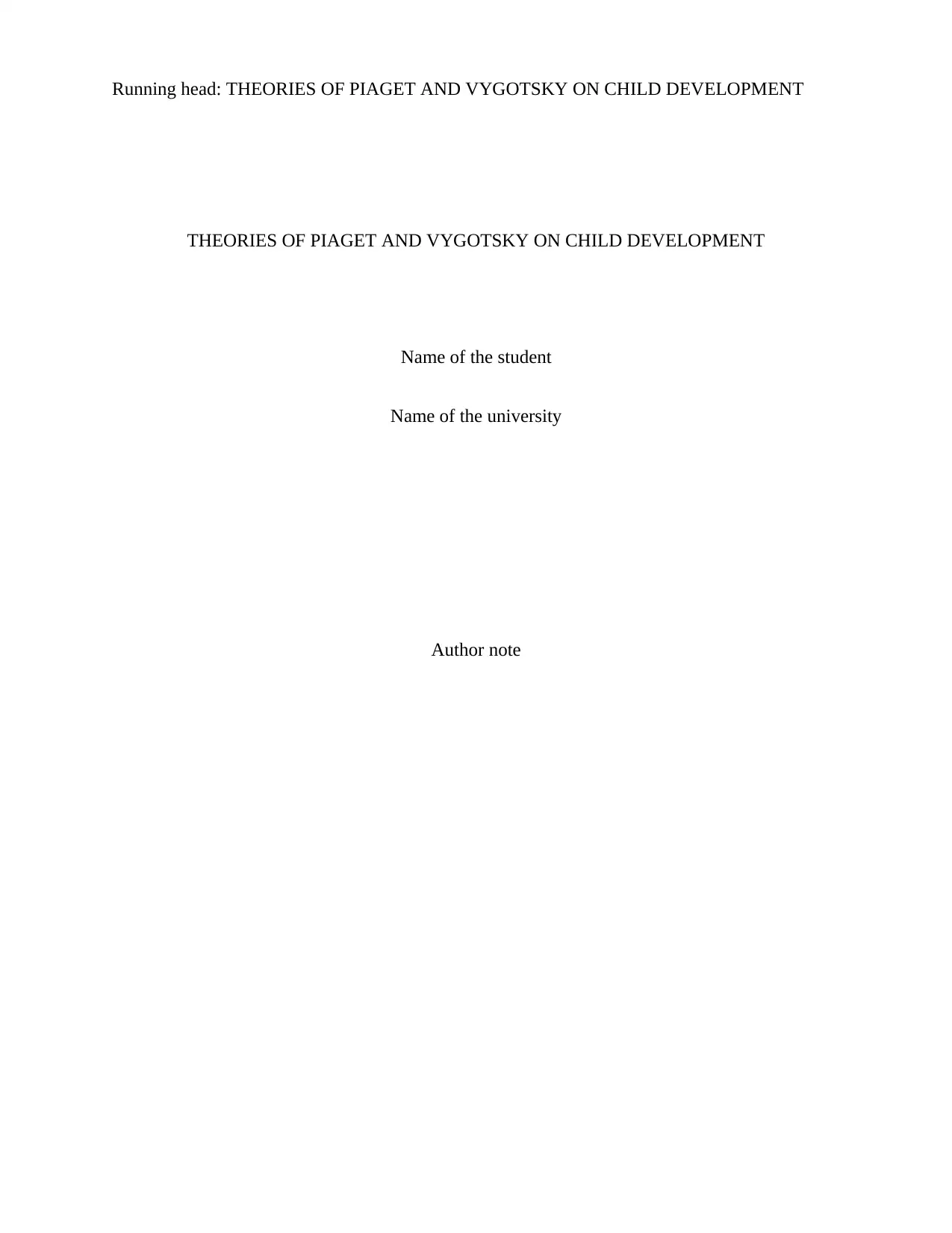
Running head: THEORIES OF PIAGET AND VYGOTSKY ON CHILD DEVELOPMENT
THEORIES OF PIAGET AND VYGOTSKY ON CHILD DEVELOPMENT
Name of the student
Name of the university
Author note
THEORIES OF PIAGET AND VYGOTSKY ON CHILD DEVELOPMENT
Name of the student
Name of the university
Author note
Paraphrase This Document
Need a fresh take? Get an instant paraphrase of this document with our AI Paraphraser
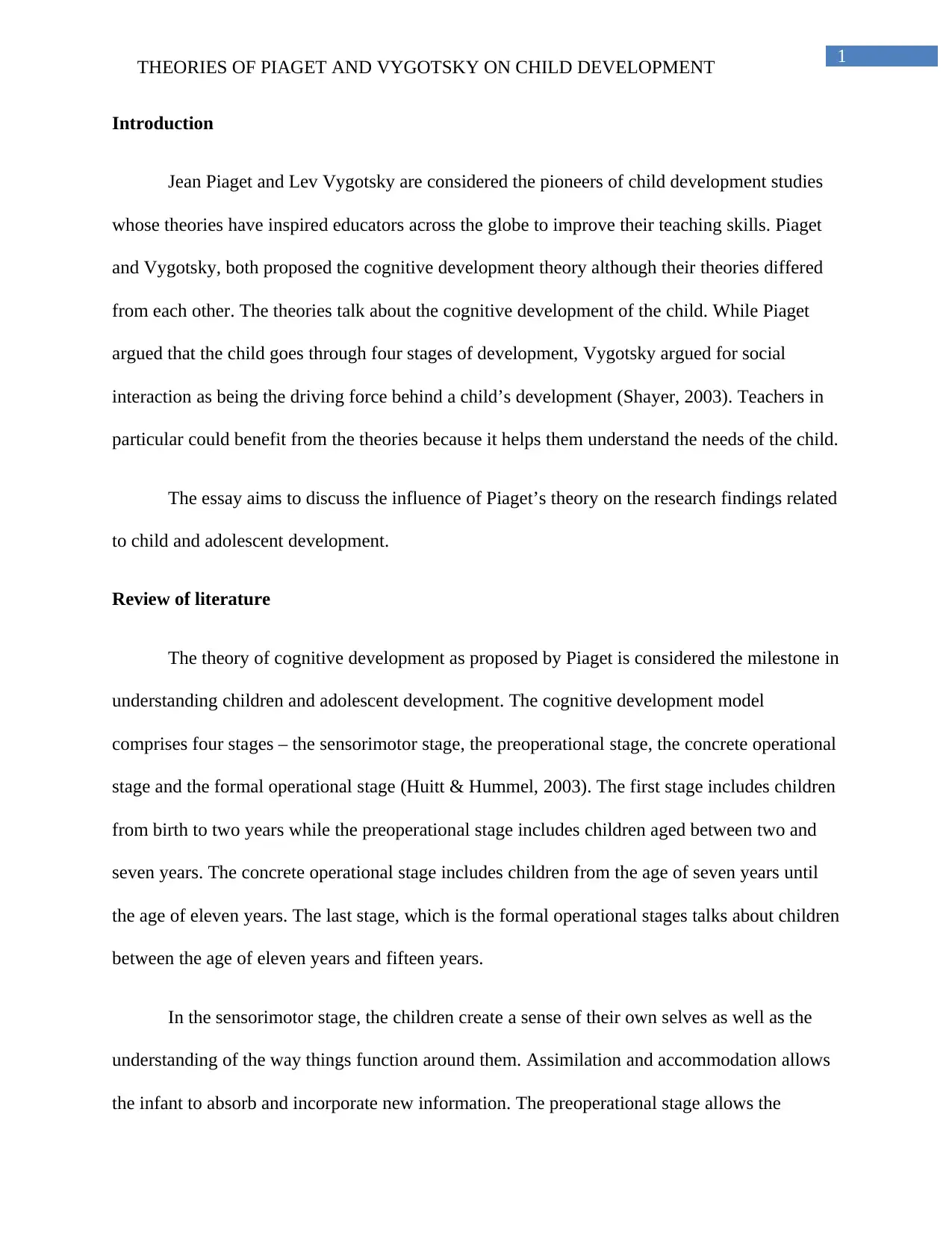
1
THEORIES OF PIAGET AND VYGOTSKY ON CHILD DEVELOPMENT
Introduction
Jean Piaget and Lev Vygotsky are considered the pioneers of child development studies
whose theories have inspired educators across the globe to improve their teaching skills. Piaget
and Vygotsky, both proposed the cognitive development theory although their theories differed
from each other. The theories talk about the cognitive development of the child. While Piaget
argued that the child goes through four stages of development, Vygotsky argued for social
interaction as being the driving force behind a child’s development (Shayer, 2003). Teachers in
particular could benefit from the theories because it helps them understand the needs of the child.
The essay aims to discuss the influence of Piaget’s theory on the research findings related
to child and adolescent development.
Review of literature
The theory of cognitive development as proposed by Piaget is considered the milestone in
understanding children and adolescent development. The cognitive development model
comprises four stages – the sensorimotor stage, the preoperational stage, the concrete operational
stage and the formal operational stage (Huitt & Hummel, 2003). The first stage includes children
from birth to two years while the preoperational stage includes children aged between two and
seven years. The concrete operational stage includes children from the age of seven years until
the age of eleven years. The last stage, which is the formal operational stages talks about children
between the age of eleven years and fifteen years.
In the sensorimotor stage, the children create a sense of their own selves as well as the
understanding of the way things function around them. Assimilation and accommodation allows
the infant to absorb and incorporate new information. The preoperational stage allows the
THEORIES OF PIAGET AND VYGOTSKY ON CHILD DEVELOPMENT
Introduction
Jean Piaget and Lev Vygotsky are considered the pioneers of child development studies
whose theories have inspired educators across the globe to improve their teaching skills. Piaget
and Vygotsky, both proposed the cognitive development theory although their theories differed
from each other. The theories talk about the cognitive development of the child. While Piaget
argued that the child goes through four stages of development, Vygotsky argued for social
interaction as being the driving force behind a child’s development (Shayer, 2003). Teachers in
particular could benefit from the theories because it helps them understand the needs of the child.
The essay aims to discuss the influence of Piaget’s theory on the research findings related
to child and adolescent development.
Review of literature
The theory of cognitive development as proposed by Piaget is considered the milestone in
understanding children and adolescent development. The cognitive development model
comprises four stages – the sensorimotor stage, the preoperational stage, the concrete operational
stage and the formal operational stage (Huitt & Hummel, 2003). The first stage includes children
from birth to two years while the preoperational stage includes children aged between two and
seven years. The concrete operational stage includes children from the age of seven years until
the age of eleven years. The last stage, which is the formal operational stages talks about children
between the age of eleven years and fifteen years.
In the sensorimotor stage, the children create a sense of their own selves as well as the
understanding of the way things function around them. Assimilation and accommodation allows
the infant to absorb and incorporate new information. The preoperational stage allows the
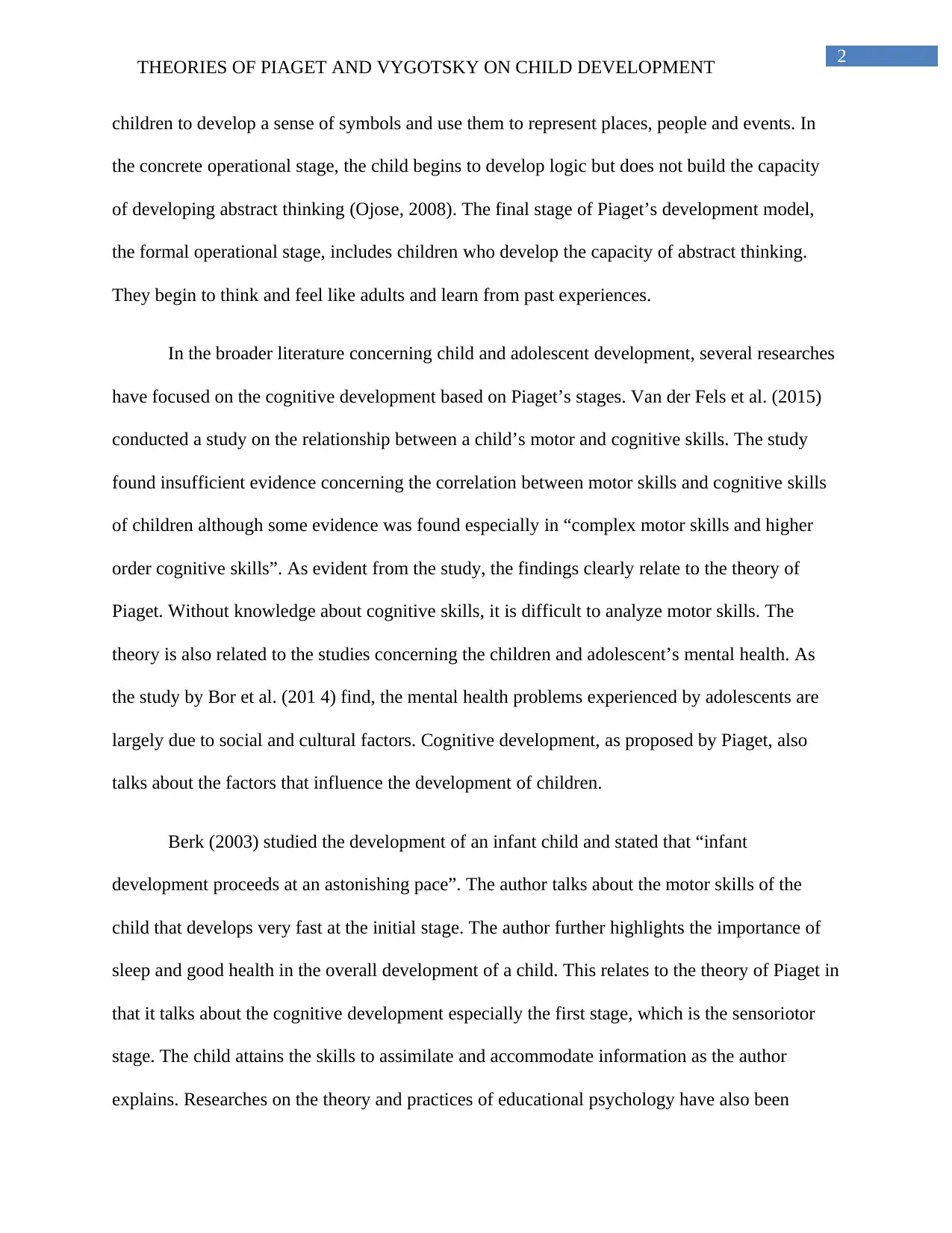
2
THEORIES OF PIAGET AND VYGOTSKY ON CHILD DEVELOPMENT
children to develop a sense of symbols and use them to represent places, people and events. In
the concrete operational stage, the child begins to develop logic but does not build the capacity
of developing abstract thinking (Ojose, 2008). The final stage of Piaget’s development model,
the formal operational stage, includes children who develop the capacity of abstract thinking.
They begin to think and feel like adults and learn from past experiences.
In the broader literature concerning child and adolescent development, several researches
have focused on the cognitive development based on Piaget’s stages. Van der Fels et al. (2015)
conducted a study on the relationship between a child’s motor and cognitive skills. The study
found insufficient evidence concerning the correlation between motor skills and cognitive skills
of children although some evidence was found especially in “complex motor skills and higher
order cognitive skills”. As evident from the study, the findings clearly relate to the theory of
Piaget. Without knowledge about cognitive skills, it is difficult to analyze motor skills. The
theory is also related to the studies concerning the children and adolescent’s mental health. As
the study by Bor et al. (201 4) find, the mental health problems experienced by adolescents are
largely due to social and cultural factors. Cognitive development, as proposed by Piaget, also
talks about the factors that influence the development of children.
Berk (2003) studied the development of an infant child and stated that “infant
development proceeds at an astonishing pace”. The author talks about the motor skills of the
child that develops very fast at the initial stage. The author further highlights the importance of
sleep and good health in the overall development of a child. This relates to the theory of Piaget in
that it talks about the cognitive development especially the first stage, which is the sensoriotor
stage. The child attains the skills to assimilate and accommodate information as the author
explains. Researches on the theory and practices of educational psychology have also been
THEORIES OF PIAGET AND VYGOTSKY ON CHILD DEVELOPMENT
children to develop a sense of symbols and use them to represent places, people and events. In
the concrete operational stage, the child begins to develop logic but does not build the capacity
of developing abstract thinking (Ojose, 2008). The final stage of Piaget’s development model,
the formal operational stage, includes children who develop the capacity of abstract thinking.
They begin to think and feel like adults and learn from past experiences.
In the broader literature concerning child and adolescent development, several researches
have focused on the cognitive development based on Piaget’s stages. Van der Fels et al. (2015)
conducted a study on the relationship between a child’s motor and cognitive skills. The study
found insufficient evidence concerning the correlation between motor skills and cognitive skills
of children although some evidence was found especially in “complex motor skills and higher
order cognitive skills”. As evident from the study, the findings clearly relate to the theory of
Piaget. Without knowledge about cognitive skills, it is difficult to analyze motor skills. The
theory is also related to the studies concerning the children and adolescent’s mental health. As
the study by Bor et al. (201 4) find, the mental health problems experienced by adolescents are
largely due to social and cultural factors. Cognitive development, as proposed by Piaget, also
talks about the factors that influence the development of children.
Berk (2003) studied the development of an infant child and stated that “infant
development proceeds at an astonishing pace”. The author talks about the motor skills of the
child that develops very fast at the initial stage. The author further highlights the importance of
sleep and good health in the overall development of a child. This relates to the theory of Piaget in
that it talks about the cognitive development especially the first stage, which is the sensoriotor
stage. The child attains the skills to assimilate and accommodate information as the author
explains. Researches on the theory and practices of educational psychology have also been
⊘ This is a preview!⊘
Do you want full access?
Subscribe today to unlock all pages.

Trusted by 1+ million students worldwide
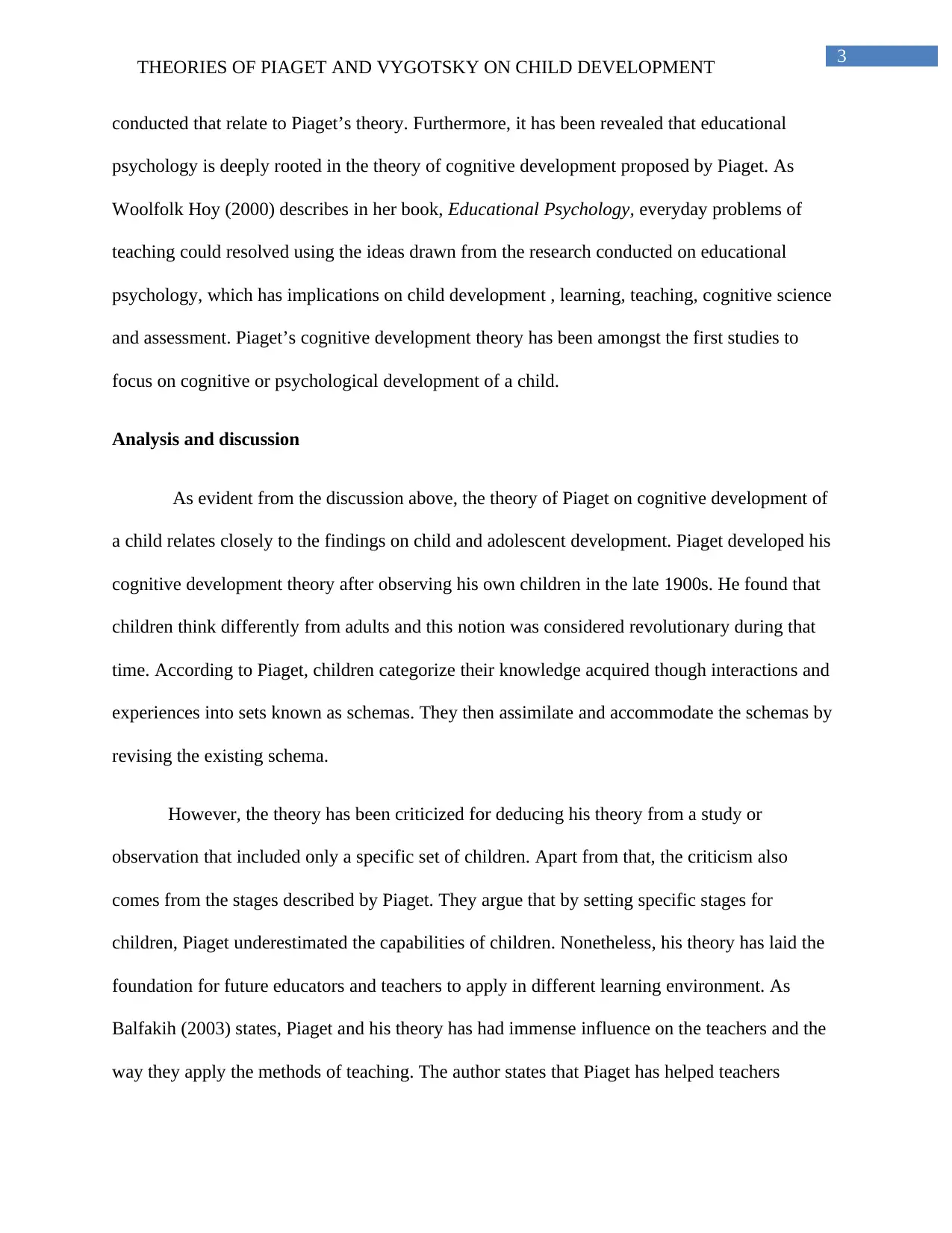
3
THEORIES OF PIAGET AND VYGOTSKY ON CHILD DEVELOPMENT
conducted that relate to Piaget’s theory. Furthermore, it has been revealed that educational
psychology is deeply rooted in the theory of cognitive development proposed by Piaget. As
Woolfolk Hoy (2000) describes in her book, Educational Psychology, everyday problems of
teaching could resolved using the ideas drawn from the research conducted on educational
psychology, which has implications on child development , learning, teaching, cognitive science
and assessment. Piaget’s cognitive development theory has been amongst the first studies to
focus on cognitive or psychological development of a child.
Analysis and discussion
As evident from the discussion above, the theory of Piaget on cognitive development of
a child relates closely to the findings on child and adolescent development. Piaget developed his
cognitive development theory after observing his own children in the late 1900s. He found that
children think differently from adults and this notion was considered revolutionary during that
time. According to Piaget, children categorize their knowledge acquired though interactions and
experiences into sets known as schemas. They then assimilate and accommodate the schemas by
revising the existing schema.
However, the theory has been criticized for deducing his theory from a study or
observation that included only a specific set of children. Apart from that, the criticism also
comes from the stages described by Piaget. They argue that by setting specific stages for
children, Piaget underestimated the capabilities of children. Nonetheless, his theory has laid the
foundation for future educators and teachers to apply in different learning environment. As
Balfakih (2003) states, Piaget and his theory has had immense influence on the teachers and the
way they apply the methods of teaching. The author states that Piaget has helped teachers
THEORIES OF PIAGET AND VYGOTSKY ON CHILD DEVELOPMENT
conducted that relate to Piaget’s theory. Furthermore, it has been revealed that educational
psychology is deeply rooted in the theory of cognitive development proposed by Piaget. As
Woolfolk Hoy (2000) describes in her book, Educational Psychology, everyday problems of
teaching could resolved using the ideas drawn from the research conducted on educational
psychology, which has implications on child development , learning, teaching, cognitive science
and assessment. Piaget’s cognitive development theory has been amongst the first studies to
focus on cognitive or psychological development of a child.
Analysis and discussion
As evident from the discussion above, the theory of Piaget on cognitive development of
a child relates closely to the findings on child and adolescent development. Piaget developed his
cognitive development theory after observing his own children in the late 1900s. He found that
children think differently from adults and this notion was considered revolutionary during that
time. According to Piaget, children categorize their knowledge acquired though interactions and
experiences into sets known as schemas. They then assimilate and accommodate the schemas by
revising the existing schema.
However, the theory has been criticized for deducing his theory from a study or
observation that included only a specific set of children. Apart from that, the criticism also
comes from the stages described by Piaget. They argue that by setting specific stages for
children, Piaget underestimated the capabilities of children. Nonetheless, his theory has laid the
foundation for future educators and teachers to apply in different learning environment. As
Balfakih (2003) states, Piaget and his theory has had immense influence on the teachers and the
way they apply the methods of teaching. The author states that Piaget has helped teachers
Paraphrase This Document
Need a fresh take? Get an instant paraphrase of this document with our AI Paraphraser
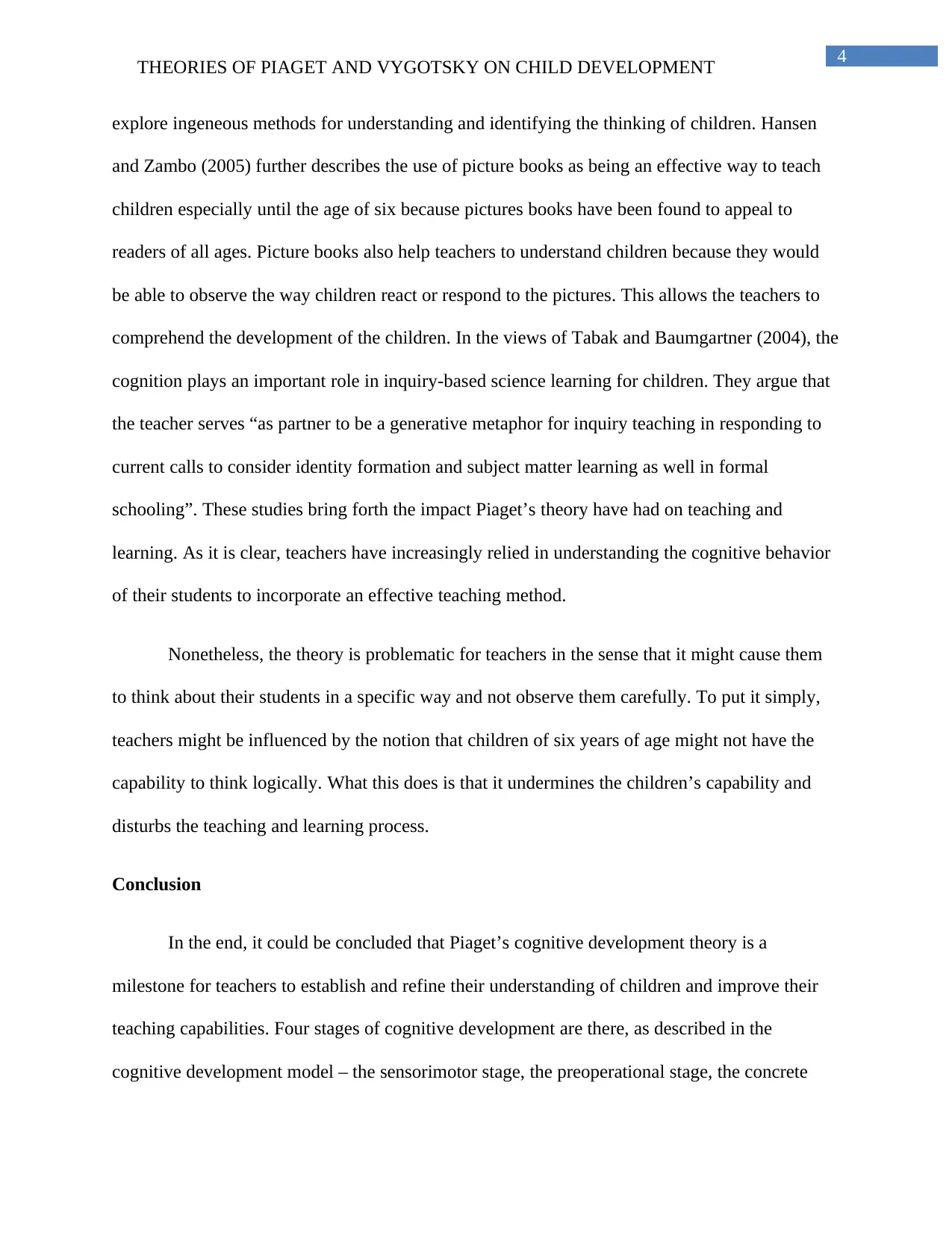
4
THEORIES OF PIAGET AND VYGOTSKY ON CHILD DEVELOPMENT
explore ingeneous methods for understanding and identifying the thinking of children. Hansen
and Zambo (2005) further describes the use of picture books as being an effective way to teach
children especially until the age of six because pictures books have been found to appeal to
readers of all ages. Picture books also help teachers to understand children because they would
be able to observe the way children react or respond to the pictures. This allows the teachers to
comprehend the development of the children. In the views of Tabak and Baumgartner (2004), the
cognition plays an important role in inquiry-based science learning for children. They argue that
the teacher serves “as partner to be a generative metaphor for inquiry teaching in responding to
current calls to consider identity formation and subject matter learning as well in formal
schooling”. These studies bring forth the impact Piaget’s theory have had on teaching and
learning. As it is clear, teachers have increasingly relied in understanding the cognitive behavior
of their students to incorporate an effective teaching method.
Nonetheless, the theory is problematic for teachers in the sense that it might cause them
to think about their students in a specific way and not observe them carefully. To put it simply,
teachers might be influenced by the notion that children of six years of age might not have the
capability to think logically. What this does is that it undermines the children’s capability and
disturbs the teaching and learning process.
Conclusion
In the end, it could be concluded that Piaget’s cognitive development theory is a
milestone for teachers to establish and refine their understanding of children and improve their
teaching capabilities. Four stages of cognitive development are there, as described in the
cognitive development model – the sensorimotor stage, the preoperational stage, the concrete
THEORIES OF PIAGET AND VYGOTSKY ON CHILD DEVELOPMENT
explore ingeneous methods for understanding and identifying the thinking of children. Hansen
and Zambo (2005) further describes the use of picture books as being an effective way to teach
children especially until the age of six because pictures books have been found to appeal to
readers of all ages. Picture books also help teachers to understand children because they would
be able to observe the way children react or respond to the pictures. This allows the teachers to
comprehend the development of the children. In the views of Tabak and Baumgartner (2004), the
cognition plays an important role in inquiry-based science learning for children. They argue that
the teacher serves “as partner to be a generative metaphor for inquiry teaching in responding to
current calls to consider identity formation and subject matter learning as well in formal
schooling”. These studies bring forth the impact Piaget’s theory have had on teaching and
learning. As it is clear, teachers have increasingly relied in understanding the cognitive behavior
of their students to incorporate an effective teaching method.
Nonetheless, the theory is problematic for teachers in the sense that it might cause them
to think about their students in a specific way and not observe them carefully. To put it simply,
teachers might be influenced by the notion that children of six years of age might not have the
capability to think logically. What this does is that it undermines the children’s capability and
disturbs the teaching and learning process.
Conclusion
In the end, it could be concluded that Piaget’s cognitive development theory is a
milestone for teachers to establish and refine their understanding of children and improve their
teaching capabilities. Four stages of cognitive development are there, as described in the
cognitive development model – the sensorimotor stage, the preoperational stage, the concrete

5
THEORIES OF PIAGET AND VYGOTSKY ON CHILD DEVELOPMENT
operational stage and the formal operational stage. The discussion also found that the theory has
been criticized for underestimating a child’s capability to think and act logically and responsibly.
This also has implications on the teaching and learning as the discussion revealed.
THEORIES OF PIAGET AND VYGOTSKY ON CHILD DEVELOPMENT
operational stage and the formal operational stage. The discussion also found that the theory has
been criticized for underestimating a child’s capability to think and act logically and responsibly.
This also has implications on the teaching and learning as the discussion revealed.
⊘ This is a preview!⊘
Do you want full access?
Subscribe today to unlock all pages.

Trusted by 1+ million students worldwide
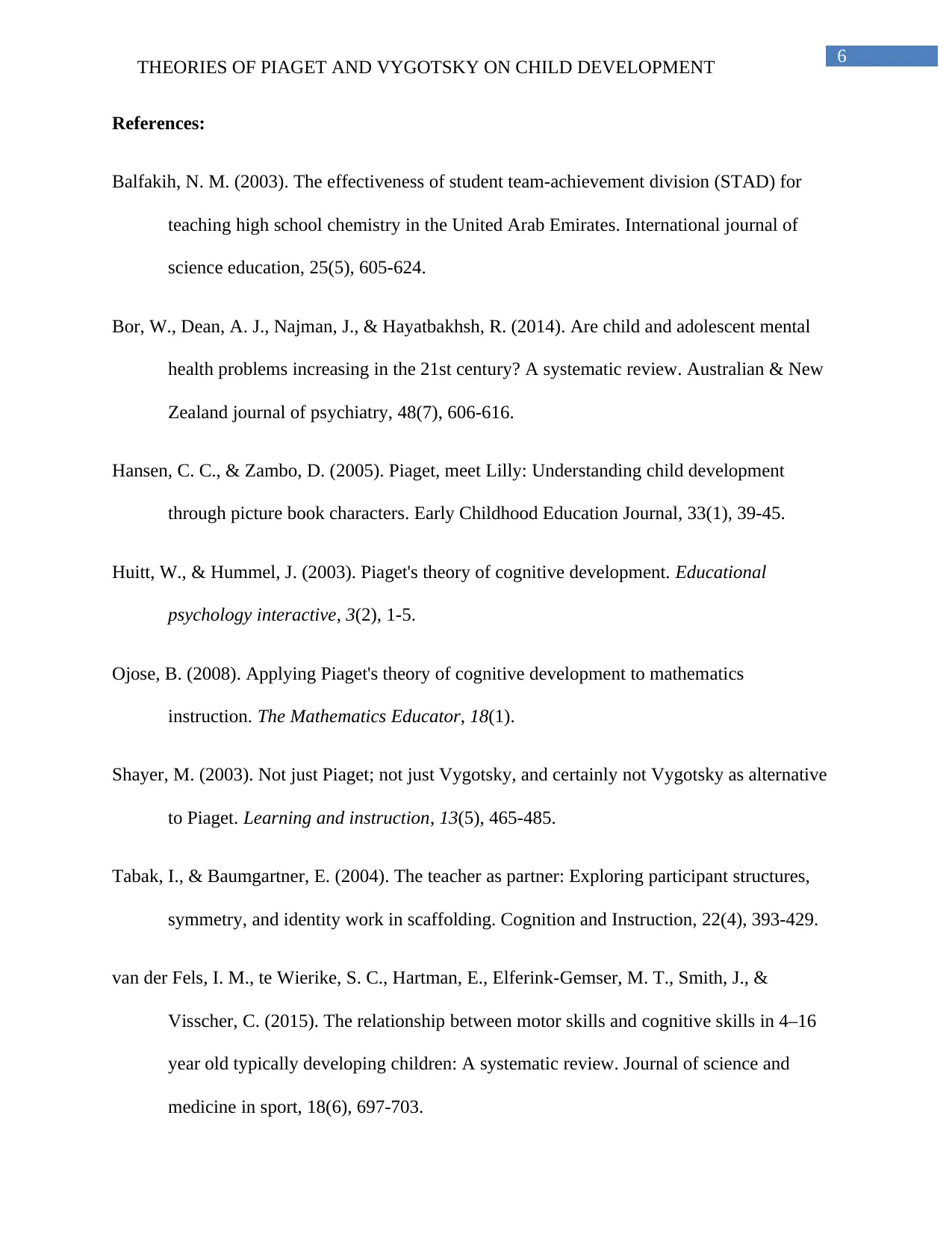
6
THEORIES OF PIAGET AND VYGOTSKY ON CHILD DEVELOPMENT
References:
Balfakih, N. M. (2003). The effectiveness of student team-achievement division (STAD) for
teaching high school chemistry in the United Arab Emirates. International journal of
science education, 25(5), 605-624.
Bor, W., Dean, A. J., Najman, J., & Hayatbakhsh, R. (2014). Are child and adolescent mental
health problems increasing in the 21st century? A systematic review. Australian & New
Zealand journal of psychiatry, 48(7), 606-616.
Hansen, C. C., & Zambo, D. (2005). Piaget, meet Lilly: Understanding child development
through picture book characters. Early Childhood Education Journal, 33(1), 39-45.
Huitt, W., & Hummel, J. (2003). Piaget's theory of cognitive development. Educational
psychology interactive, 3(2), 1-5.
Ojose, B. (2008). Applying Piaget's theory of cognitive development to mathematics
instruction. The Mathematics Educator, 18(1).
Shayer, M. (2003). Not just Piaget; not just Vygotsky, and certainly not Vygotsky as alternative
to Piaget. Learning and instruction, 13(5), 465-485.
Tabak, I., & Baumgartner, E. (2004). The teacher as partner: Exploring participant structures,
symmetry, and identity work in scaffolding. Cognition and Instruction, 22(4), 393-429.
van der Fels, I. M., te Wierike, S. C., Hartman, E., Elferink-Gemser, M. T., Smith, J., &
Visscher, C. (2015). The relationship between motor skills and cognitive skills in 4–16
year old typically developing children: A systematic review. Journal of science and
medicine in sport, 18(6), 697-703.
THEORIES OF PIAGET AND VYGOTSKY ON CHILD DEVELOPMENT
References:
Balfakih, N. M. (2003). The effectiveness of student team-achievement division (STAD) for
teaching high school chemistry in the United Arab Emirates. International journal of
science education, 25(5), 605-624.
Bor, W., Dean, A. J., Najman, J., & Hayatbakhsh, R. (2014). Are child and adolescent mental
health problems increasing in the 21st century? A systematic review. Australian & New
Zealand journal of psychiatry, 48(7), 606-616.
Hansen, C. C., & Zambo, D. (2005). Piaget, meet Lilly: Understanding child development
through picture book characters. Early Childhood Education Journal, 33(1), 39-45.
Huitt, W., & Hummel, J. (2003). Piaget's theory of cognitive development. Educational
psychology interactive, 3(2), 1-5.
Ojose, B. (2008). Applying Piaget's theory of cognitive development to mathematics
instruction. The Mathematics Educator, 18(1).
Shayer, M. (2003). Not just Piaget; not just Vygotsky, and certainly not Vygotsky as alternative
to Piaget. Learning and instruction, 13(5), 465-485.
Tabak, I., & Baumgartner, E. (2004). The teacher as partner: Exploring participant structures,
symmetry, and identity work in scaffolding. Cognition and Instruction, 22(4), 393-429.
van der Fels, I. M., te Wierike, S. C., Hartman, E., Elferink-Gemser, M. T., Smith, J., &
Visscher, C. (2015). The relationship between motor skills and cognitive skills in 4–16
year old typically developing children: A systematic review. Journal of science and
medicine in sport, 18(6), 697-703.
Paraphrase This Document
Need a fresh take? Get an instant paraphrase of this document with our AI Paraphraser
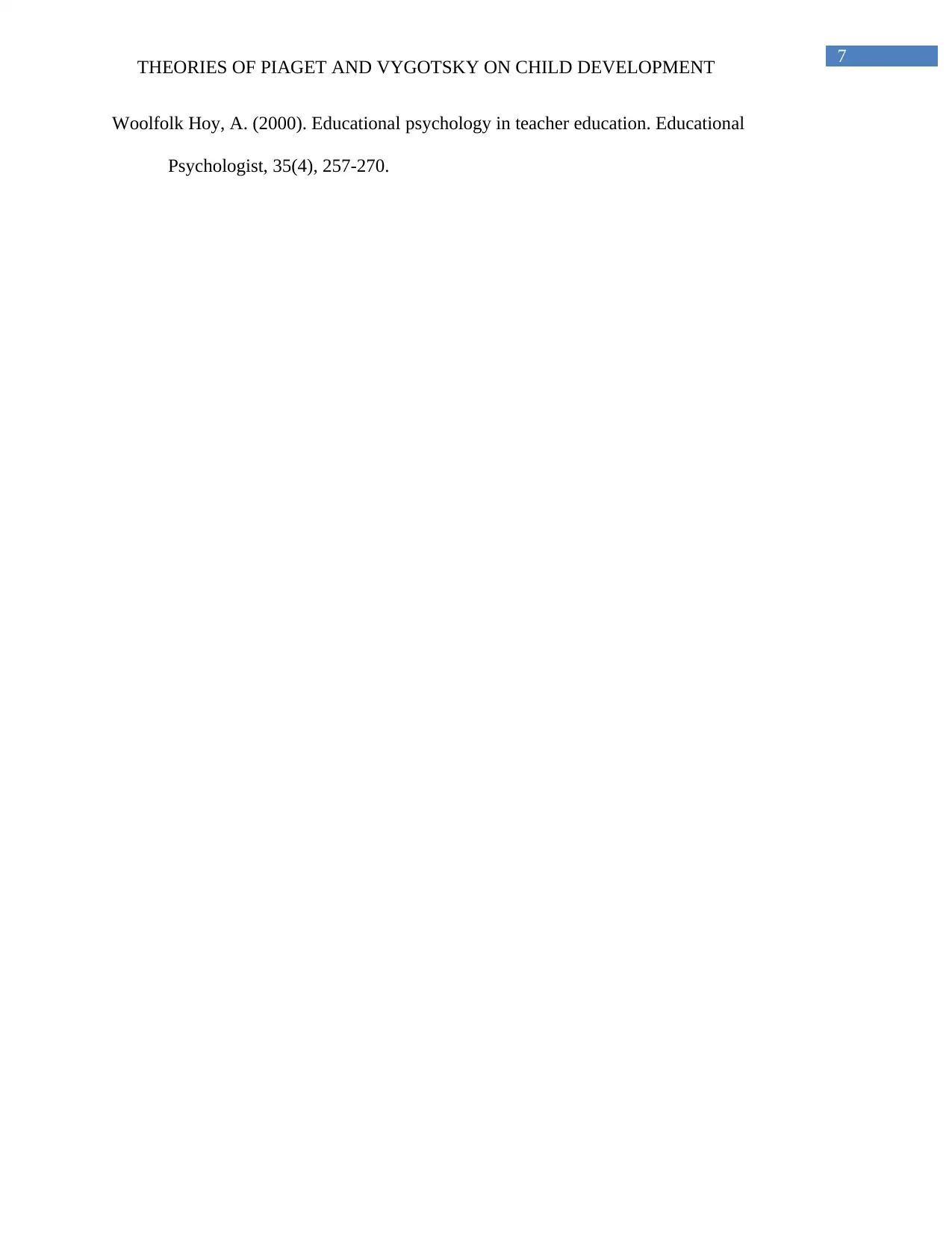
7
THEORIES OF PIAGET AND VYGOTSKY ON CHILD DEVELOPMENT
Woolfolk Hoy, A. (2000). Educational psychology in teacher education. Educational
Psychologist, 35(4), 257-270.
THEORIES OF PIAGET AND VYGOTSKY ON CHILD DEVELOPMENT
Woolfolk Hoy, A. (2000). Educational psychology in teacher education. Educational
Psychologist, 35(4), 257-270.
1 out of 8
Related Documents
Your All-in-One AI-Powered Toolkit for Academic Success.
+13062052269
info@desklib.com
Available 24*7 on WhatsApp / Email
![[object Object]](/_next/static/media/star-bottom.7253800d.svg)
Unlock your academic potential
Copyright © 2020–2026 A2Z Services. All Rights Reserved. Developed and managed by ZUCOL.





